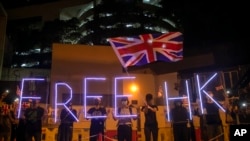Prabhu Singh has made Hong Kong his home for 25 years, selling Indian sweets and milky masala tea from his tiny stall in a warren-like den full of other Asian businessmen in Kowloon.
Nearly every weekend for the last four months, anti-government protests have traversed the road in front of his shop – and police recently fired a water cannon at a nearby mosque frequented by the South Asian community. That incident prompted the city’s chief executive to apologize to the community, many of whom have been settled here for generations.
As a result, Singh said, life is a little less sweet now. He’s one of the 8% of residents of this semi-autonomous Chinese city who are not ethnically Chinese. As such, they don’t have all the same rights as their Chinese counterparts, regardless of whether they were born here or how long they’ve been here.
That puts him and his colleagues on the sidelines of the biggest unrest this city has seen in decades. Immigrants to this city, who mainly come from the Philippines, Indonesia, India and Pakistan, are quick to say that Hong Kong’s liberal commercial scene is what drew them here for work. Few, though, are willing to openly discuss politics. Many told VOA off-camera that they support the protests in spirit but won’t join in because, as immigrants, being arrested would result in swift deportation.
So Singh, too, is careful with his words.
“The protests, I think, it’s like, they are like for the betterment of Hong Kong,” he told VOA on a recent evening, as Hongkongers gathered outside to show their support for the city’s immigrant community. “They demand something, and the government is not agreeing on thinking like that.”
His attitude is in stark contrast to the handful of visiting foreigners who have enthusiastically joined the protests. Protesters have exhorted the outside world to help, waving U.S. and British flags during protests. American college student Jose Fernandez said he felt he had to join the protests, because he feels this is everyone’s fight.
“I have no family connections to Hong Kong,” said Fernandez, who says he attends the University of California,Riverside,“but we’ve got to fight for freedom, no matter who it is.”
That’s a tougher line for longtime residents to walk. Filipino residents make up one-third of the city’s immigrant workforce, many of them working in households. Many, like domestic worker Amy Arellano, say the protests have been disruptive, as public transport has been shut down.
“Join the protests? No,” she said. “We just listen to the news, what is happening outside, but we’re not able to join, no, no, no, Filipinos don’t like. Because it causes problems for us. We aren’t resident here. We’re just aliens in Hong Kong.’
Nuki, an Indonesian national, has lived here for 11 years, as a domestic worker. On a recent day, she and several dozen other Indonesian nationals were rehearsing a traditional dance for a festival later this year.
“We are hoping Hong Kong will be more peaceful like before,” she said. “I love Hong Kong. We love Hong Kong.”
But Chinese Hongkongers say they understand this dilemma. This week, in the wake of the mosque incident, they gathered near Chungking Mansions, the immigrant hub, to show their support of immigrants.
And, they say, they’ll be their voice.











